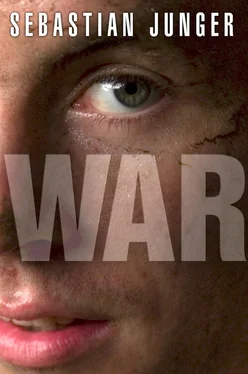One day a patrol goes down to Loy Kalay, searches the bazaar, and returns without even generating radio chatter. A squad-plus sets in an ambush on a south-facing hill just outside the wire but all they see are women collecting firewood. Another patrol turns up wires running to a 107 mm rocket hidden in a wood pile and an explosives team comes in by helicopter to blow it up. The men at Restrepo work slowly at odd jobs around the base and lift weights while the sun is still high and then break at the end of the day to sit on the ammo hooch smoking. At eight o’clock the generator cuts out and everyone goes to their bunks; after that, the only men awake are the ones at the guardposts. Sometimes it would occur to me how incredible — how very close to the experience of childhood — it is to be watched over by others while you slowly float off into sleep.
One evening Steiner and I are sitting around the heater and he’s telling me about his efforts to understand women. He wants to understand them so that he can sleep with them more easily. He has read everything he can on the topic, including books on feminism, and he favors what he calls the “cocky-funny” routine when talking to them, which is explained in one of his books. Steiner was a wrestler in high school and has sandy blond hair and a big wide-open smile and looks like he could easily carry a kitchen sink up a mountain. “He’s too pretty for himself,” was how First Sergeant Caldwell described him to me once. Steiner arrived in the Korengal a few months late, having spent the beginning of the deployment as a driver for the battalion sergeant major. He and I discuss women for a while and eventually Lambert shuffles in and looks around. Lambert’s new to the platoon and is from the South and has a slight stammer that he claims women fall for. He says he killed his first deer at age ten, and his father made him gut it and then take a bite of the raw heart (“ — and I’ve been stuttering ever since,” someone else jokingly finished the story for him).
Lambert says he’s going to start a landscaping business when he gets home and then he’s going to buy a backhoe and dig graves in cemeteries. “It’s guaranteed work because people die every day,” he says. “People die and it’s, like, five hundred dollars a grave and you can dig five or six graves in a day.”
I watch Steiner frown and consider this plan. It seems like there should be a catch but maybe there’s not; maybe earning a living really is that simple. Steiner is still thinking about it when Jackson and Monroe walk in. The first nickname Jackson got in the platoon was “Jacko,” but that was quickly changed to “Wacko.” Wacko made an impression early on by completing a twelve-mile road march on blisters that were so bad his boots filled with blood. Monroe’s nickname is “Money.” Money will barely speak for days at a time but looks around in ways that suggest he knows something no one else has figured out yet. Maybe he has. He’s lean and a little feral-looking and very tough. He makes a kind of bleating sound from time to time, a cross between a goat and a machine gun, and for a while he was hiding behind things at Restrepo and jumping out at unsuspecting men screaming, “WHAT’S UP MOTHERFUCKER?” The sudden boredom after fighting season ended affected everyone differently.
Lambert is still talking about gravedigging when O’Byrne walks in. He has his cap pulled low over his eyes and a quilted parka liner buttoned with just the top button and his face is smudged with dirt and his pants are ripped in three different places. O’Byrne arrived in the Army with a mustache and a full head of hair but by the time he got to the Korengal he’d shaved both off. During his two years in the service much of his hair had disappeared anyway. (“The Army stole my hair,” he liked to say. “But who needs fucking hair?”) He leans against one of the bunks and announces that he’s going to write a book about his life one day. Someone asks him why.
“Because of all the interesting shit that’s happened,” he says.
“Like what?”
“Like for starters, I was shot by my father.”
No one says a word.
“When I was a kid me and my dad liked to drink a lot,” O’Byrne continues, and someone laughs. O’Byrne’s head swivels around.
“That’s just not a sentence you hear very often,” Steiner explains.
That seems to satisfy O’Byrne, who goes on to explain how his father came to shoot him. “But everything happens for a reason, I surely do believe that,” he concludes. “If my dad hadn’t shot me I wouldn’t have joined the Army — and wouldn’t be where I am right now.”
He says this without a trace of irony. There is a complicated silence in the room.
“Well, I’m not buyin’ your fuckin’ book,” Money finally says.
Months later, O’Byrne told me the whole terrible story. I already knew he’d grown up in a small town, and I asked if he’d ever hunted as a kid. He said once he killed a salamander and felt so guilty he never killed anything again.
“But I’ve always had guns… my dad always had guns,” O’Byrne said. “He raised me — which is fucking weird, but we’ll get to that — he raised me to respect weapons and never point them at anybody. Both of us failed that fucking miserably. I was a bad kid in high school, I was a fucking punk — I did not know how to be a nice kid. My dad just drank and drank and drank. So one night, for my buddy’s birthday, this girl came over and we got a gallon of vodka. Vodka is not good for me, it makes me violent as shit. I drank probably half a gallon, I was fucking obliterated, I was smashed. I get home and the first thing I see is my dad. I walk through the door and he’s fucking screaming at me. He swings. I swing. We start fighting. This fight goes on and on — I mean we fought for a long time. All my friends were trying to hold me back. Someone hit me with a two-by-four just trying to calm me down.”
The fight eventually broke up and O’Byrne went to his room. After a while he heard his father yelling again, so he went back downstairs and started walking back and forth in front of his father’s bedroom door, screaming at him. Suddenly his hip gave out and the next thing he knew he was lying in the hallway and his leg didn’t work. He didn’t hear gunshots or feel any pain and he thought he’d somehow dislocated his hip. Then his father came out of the bedroom and pointed a rifle at his head. It was O’Byrne’s favorite gun, a semiautomatic Ruger with a folding stock, and O’Byrne said, ‘So you’re going to shoot me when I’m down?’ and his father said, ‘I already did.’
“I was too drunk to realize what was going on, so I go upstairs, I walk up two flights of stairs and I start playing video games and then I go lay down because I’m losing blood. I’m crying now because I realize what’s going on and I’m in some fucking trouble now, I have two fucking bullets in me. This is not good. This is not a good situation.”
An ambulance finally arrived and O’Byrne was taken to a hospital in Scranton. He had one bullet in his hip and another in the small of his back less than an inch from his spinal column. After doctors finished operating on him a cop showed up and asked for a statement. O’Byrne thought about it: whatever his father’s problems, he’d always held down a job and provided for the family, and if he went to prison, there’d be no one to take care of the family. That would compound an already terrible situation. ‘It was my fault,’ O’Byrne told the cop. ‘He did it in self-defense.’
“My father wouldn’t have made it through jail — he’s not a violent person. The situation was violent but he’s not. So I was three days in the hospital and then they sent me to lockup — no rehab, nothing. I was charged with simple assault. I was a pussy in there, man, like, I didn’t try to fight anyone . It was the best thing — but the worst thing — that ever happened to me. My father and I put ourselves in that position to be fucking evil to each other. It’s a tough story but it’s a good one, too. How dare I hit my father — even if he hit me? If he popped me in my nose right now I’d look at him and I’d be like, ‘All right, I’m going downstairs and I’ll give you time to cool off.’ I’ll never hit that man again. That was my fault — you know? I didn’t have the respect. It’s a story of triumph. It’s a story of going through some hard shit and making out really good. I know bullets can’t stop me now. Fucking bullets are okay.”
Читать дальше
Конец ознакомительного отрывка
Купить книгу












